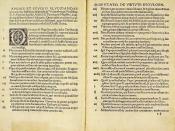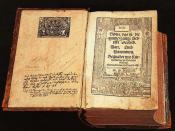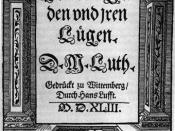Martin Luther: A Simple Pilgrim not a Revolutionary
Martin Luther's actions lead to the collapse of the most powerful institution of early modern Europe, the Catholic Church, but they were in reality only Luther's own search for an answer to salvation. Luther never had interest in revolution or in anyway being a public revolutionary. His life was devoted to god and to the scripture, he even became a monk. Luther desired to discover the true word of the scripture, for in it he believed he could find the answer to salvation. Even Luther's conflict with the church was not due to a thirst for revolution but only due to his unwavering commitment to uphold what he believed to be the true just word of the bible. Furthermore, Martin Luther had no interest in revolution of any type. When the German peasants looked to him for support he offered nothing but scorn.
Luther wished only to reform his beloved church. He believed revolution was against the word of god.
Martin Luther became a monk at the age of 21. The life of a monk during Luther's time was hard but he did not falter. Luther's time at the monastery molded him, and above all he developed a close relationship with the bible. Luther took monasticism very seriously; he observed the rules of his order, and even imposed additional rules of his own. Luther tortured himself with praying, fasting, keeping vigils, and freezing. He described it as, "inflicting on myself such pain as I would never inflict again" (Ricker 50). Luther did all of this due to his belief that he must satisfy a judging god. And not being able to satisfy such a god would lead to nothing short of eternal damnation. No matter what he did, Luther could...


